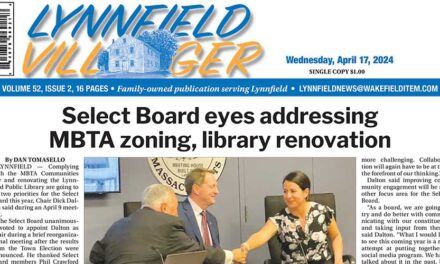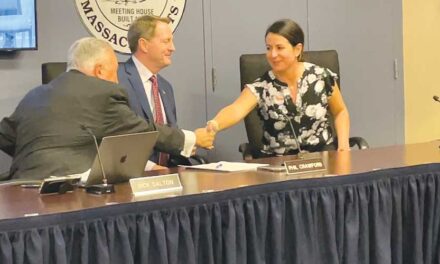Published in the August 24, 2016 edition
By DAN TOMASELLO
LYNNFIELD — The Appeals Court of Massachusetts has dismissed an appeal of an Open Meeting Law complaint, Town Counsel Tom Mullen announced at last week’s Board of Selectmen meeting.
Superior Court Judge Robert Cornetta dismissed the case Three Registered Voters vs. Board of Selectmen of Lynnfield last year. The three registered voters, former Selectman Dave Miller, former Selectman candidate Michael Walsh and resident Ryan Collard, filed an appeal of Cornetta’s ruling.
The three voters alleged the Board of Selectmen consisting of Selectmen Chairman Phil Crawford and former Selectmen Dave Nelson and Tom Terranova violated the Open Meeting Law in November 2014 by failing to give proper notice of the meeting at which Town Administrator Jim Boudreau was appointed. The three plaintiffs also alleged the selectmen failed to “properly process the complaint” and failed to “interview and to deliberate on applicants for the town administrator position in an open meeting.”
According to the Appellate Court’s decision issued by Associate Justice Elspeth Cypher, the court unanimously ruled to “affirm the dismissal of the complaint.” Mullen said the court’s ruling was “very welcome news.”
“Incidentally, this was the first Open Meeting Law case to reach an Appellate Court since the 2010 overhaul of the Open Meeting Law,” said Mullen.
According to Mullen’s expense report obtained by the Villager, the Three Registered Voters vs. the Board of Selectmen of Lynnfield cost the town $4,634.50 in legal costs from Feb. 14–April 16. In that same time frame, legal costs totaled $8,054.50 for Mullen handing Open Meeting Law complaints.
In the court’s ruling, Cypher stated after the selectmen voted to appoint Boudreau to replace retired Town Administrator Bill Gustus, Walsh “timely submitted his complaint to the board, attached to the Attorney General’s Open Meeting Law complaint form.” Cypher said Gustus referred the complaint to Mullen, “who reviewed the complaint and within 14 days sent a detailed analysis and his findings to the Attorney General, with a copy sent to Walsh.” Cypher said Mullen “determined that that the board did not violate the Open Meeting Law and concluded that no remedial action was necessary.”
In Cypher’s ruling, the judge wrote: “There was no response from Walsh until, acting with the two other plaintiffs and following the alternate procedure … the voters filed a complaint in the Superior Court on Jan. 5, 2015, seeking injunction relief and a short order of notice issued. The voters also subpoenaed records and the testimony of town officials.”
“We pause here to note that we are unable to determine from the record why there was no response to town counsel’s analysis and findings from Walsh, whose abrupt change of course, not explained by the parties, appears to have been an abandonment of the procedure set in motion by his complaint to the board,” wrote Cypher in the ruling.
Cypher also wrote in the ruling that if Walsh was not satisfied with Mullen’s findings, he could file a complaint with the Attorney General. Cypher said a paralegal from the AG’s office wrote a letter to Walsh stating, “a notification and response from town counsel had been received, but because no complaint (from Walsh) had been filed with the Attorney General, it would be assumed that the action taken from the public body was sufficient and the file would be closed unless a request was made for further review.”
The Appellate Court also weighed in on the three registered voters’ claim that the selectmen failed to give proper notice Boudreau would be appointed as the town’s next town administrator.
“The voters complain that the notice for the Nov. 3, 2014 meeting only stated, ‘update on town administrator search,’ and did not indicate that there could be a vote appointing the town administrator,” wrote Cypher. “It appears from the record that, at the time of the preparation of the meeting notice, it was not known that a decision would be reached by the board. The decision to appoint came unexpectedly during the discussion of the candidates when two board members realized that they agreed on the same candidate. It was decided that further deliberation was unnecessary and that a vote should be taken in order to expedite the process.”
Cypher noted in the ruling that “nothing (in state law) requires anything more than listing the topics reasonably anticipated by the chair to be discussed at the meeting.”
The Appellate Court also dismissed the three registered voters’ claim that the selectmen mishandled the voters’ complaint.
“The voters complain that the board should have held a public discussion on their complaint,” wrote Cypher. “There is no requirement in the statute for public discussion of an Open Meeting Law complaint prior to the public body sending its response to the complaint to the Attorney General.”
The Appellate Court also dismissed the three voters’ claim that Boudreau’s appointment violated the Open Meeting Law.
“The town obtained the assistance of the MMA Consulting Group in an open meeting, where it was agreed that MMA would select seven candidates among the applicants who responded to the notice of the vacancy in the position of the town administrator,” wrote Cypher. “After information and the names of the seven candidates had been submitted to the board, it began an interview process on Oct. 29 and 30 where individual board members interviewed each individual candidate in separate rooms at the Town Hall. The then-town administrator asked each board member to rank the candidates he had interviewed; one board member declined. (Gustus) did not discuss the rankings with other members of the board and the board members avoided discussing the candidates with each other or with anyone who might communicate their view to another member.”
Cypher wrote in the court’s ruling; “nothing in the Open Meeting Law proscribes the individual interviews that took place.”
“As the judge properly concluded, these interviews did not constitute deliberations between or among a quorum of a public body, which, as required, must be conducted in an open meeting,” wrote Cypher. “The individual interviews in these circumstances allowed the individual board members to obtain information and to form an opinion on each candidate in preparation for deliberation with the other board members at an open meeting.”
The three voters also challenged the selectmen’s appointments of Fire Chief Mark Tetreault, Town Clerk Trudy Reid and Department of Public Works Director Andrew Lafferty, but Cypher wrote, “the voters did not address this issue on appeal except in a footnote in their brief.”
Terranova complaint closed
In addition to the Appellate Court’s ruling against the three registered voters, the Attorney General’s office responded to Terranova’s Open Meeting Law complaint filed against Crawford.
Terranova wanted to place two agenda items on the selectmen’s April 11 agenda, which was the former selectman’s last meeting. His first request was to make Sparhawk Drive a one-way street between Tedford Lane and Walnut Street to combat illegal U-turns. His second request was prohibiting trucks from driving on Chestnut Street during morning and evening hours. Crawford declined putting both items on the selectmen’s agenda because he said residents in both neighborhoods needed to receive proper notification before the items were discussed.
After Crawford declined putting the two matters on the board’s agenda, Terranova filed an Open Meeting Law complaint against the selectmen chairman. The selectmen voted 2-0 to send the complaint to Mullen for review, with Terranova abstaining.
Mullen sent a response from the board on April 29, where he determined Crawford did not violate the Open Meeting Law because “nothing in the Open Meeting Law requires the chair to include an agenda item in a meeting notice because it is requested by a member of the public body.” Mullen also noted in his Crawford “did not understand the requested topic, requested clarification and received none.”
Kevin Manganaro, assistant attorney general Division of Open Government, responded to Terranova’s complaint in a letter obtained by the Villager.
“Under the Open Meeting Law, a complaint is ripe for review by our office when the complainant files a copy of the initial complaint with the Division of Open Government, provided that at least 30 days have passed since that complaint was filed with the public body,” said Manganaro. “We sent you a letter on May 24, 2016 stating that if we did not receive the original complaint from you by Friday, July 8, 2016, we would presume the action taken by the board was sufficient and we would close this file. Our office currently has no record of a complaint filed by you in this matter. Therefore, we now consider this matter closed.”
Selectmen react
The selectmen were pleased with the Appellate Court’s ruling.
“This is welcome news for the community,” said Selectman Chris Barrett.




